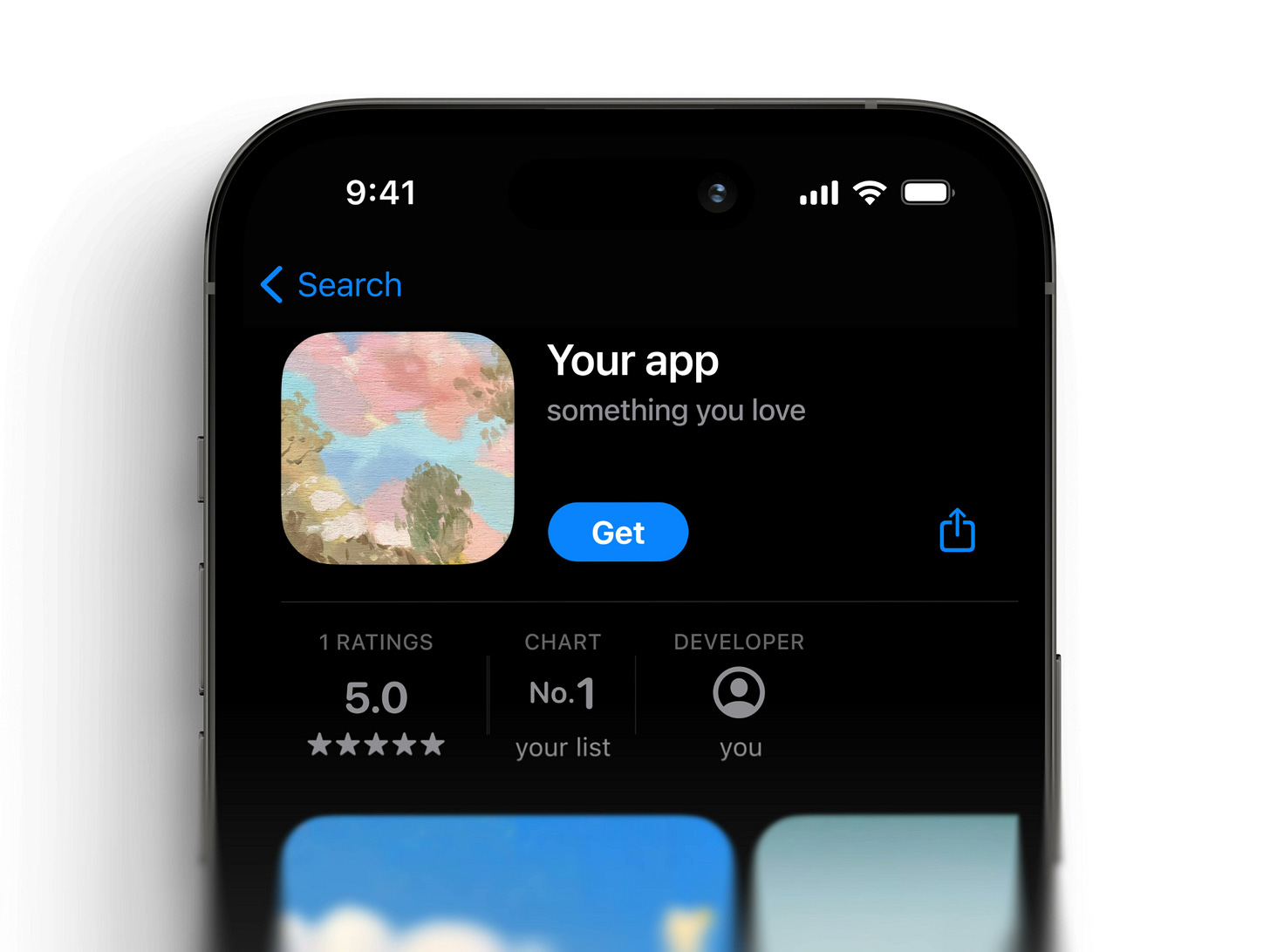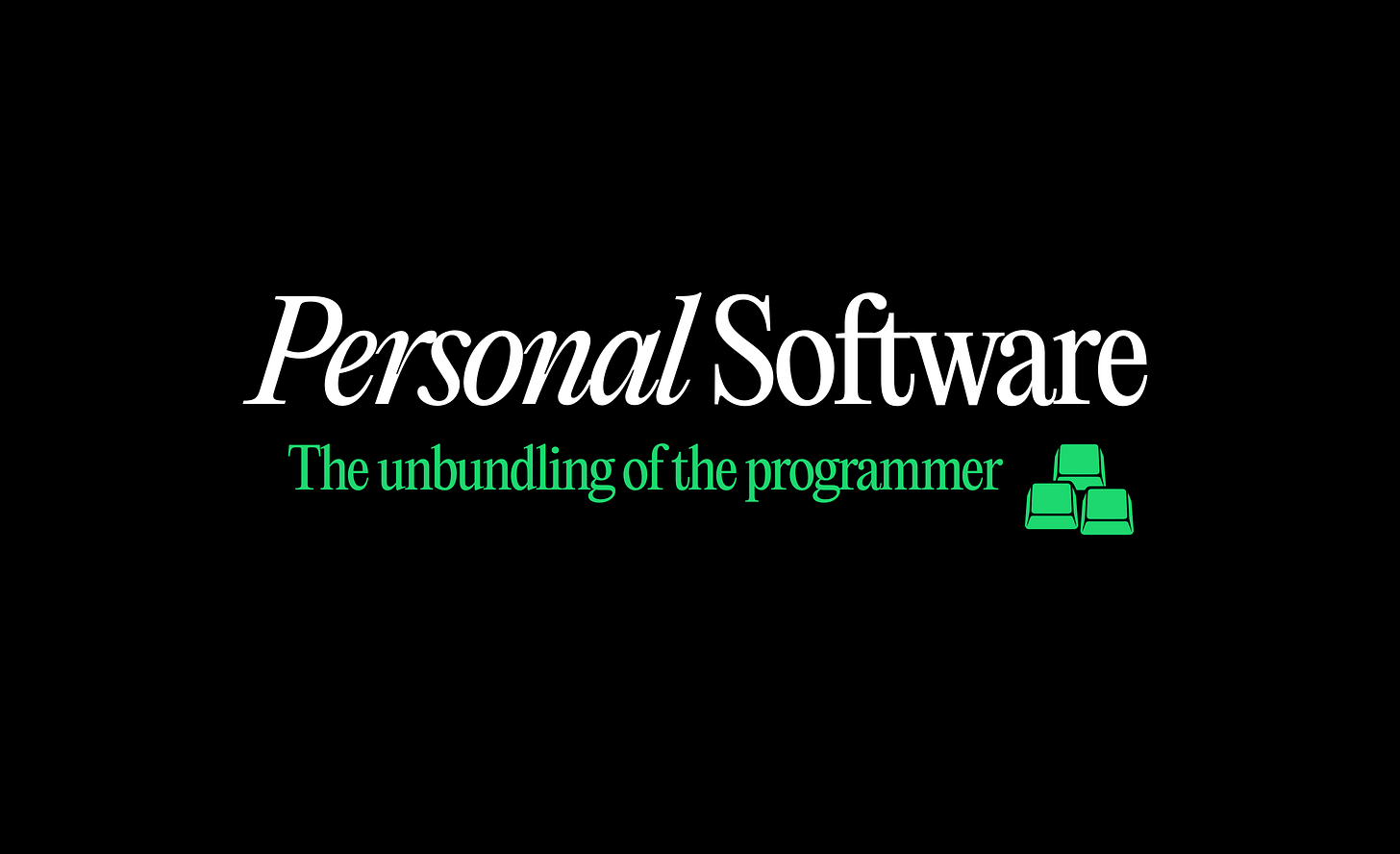Software development is undergoing a profound shift, but not in the way most predict. While headlines trumpet the "end of programming," the reality is both more interesting and more nuanced. We're witnessing the emergence of "personal software", where the boundary between users and creators becomes increasingly fluid. This is enabled by advances in large language models and AI-assisted development tools.
One of the biggest AI trends I’m excited about is personal apps. Right now, anyone can create an app tailored to their specific needs, all without hiring a developer or designer. As a product design studio founder, should I be worried about this? Not at all. The more people build things, the more they’ll start to appreciate the craft behind great software - Shane Levine
This transformation isn't about replacing programmers. Instead, it's about expanding the universe of what's possible in software creation, particularly for highly personalized and niche applications that were previously impractical to build. The real story here isn't about AI replacing human developers - it's about how AI tools are enabling a new category of software that simply couldn't exist before.
Consider the current software development landscape. Traditional software companies focus on building applications that serve broad market needs, leaving countless niche use cases unaddressed. These gaps aren't just features waiting to be built - they're entire categories of software that couldn't exist in the traditional model because they're too specialized to be commercially viable.
The rise of AI-assisted development is changing this equation. When someone can describe their specific needs conversationally and receive working code in response, the economics of personal software development shift dramatically. This isn't about building the next Photoshop or Figma - it's about enabling individuals to create highly specialized tools for their unique workflows, hobbies, and problems.
I'm completely non-technical (never coded). But I just built a Web app from my phone by chatting with an AI agent on Replit. Now I have a tracker for to answer life's most important question: "Has the dog been fed?" - Justine Moore, a16z
A crucial distinction emerges here between personal software and traditional application development. Personal software operates in a different domain with different constraints. It doesn't need to scale to millions of users, handle edge cases beyond its creator's needs, or maintain backward compatibility across versions.
Apparently, you don’t need coding experience to build apps anymore. So I made a little workout/yoga app just for me - Lenard Floeren
When the time and expertise required to create software drops dramatically, the minimum viable market size for a software project approaches one. This isn't just a quantitative change - it's a qualitative transformation in what constitutes a "marketable" software product. This simplified context is precisely what makes AI-assisted development particularly effective in this space.
The least you know of a specific domain the more impressed by AI outputs you are aka the competency illusion. - Gerard Sans
The skepticism from experienced developers about AI replacing programmers is well-founded - building and maintaining large-scale software systems does require deep technical knowledge, architectural understanding, and experience that current AI systems simply don't possess. But this skepticism sometimes blinds us to the genuine transformation happening in personal software development.
Think of it this way: just as spreadsheets enabled non-programmers to perform complex calculations and data analysis, AI-assisted development tools are enabling non-programmers to create personal software solutions. The key difference is that while spreadsheets provided a constrained environment for specific types of problems, AI-assisted development opens up the possibility of creating full-fledged applications tailored to individual needs.
This shift has profound implications for the software industry. We're moving from a world of "buy what you need" to "generate what you need." The total addressable market (TAM) for software expands dramatically when individuals can create solutions for their specific needs rather than waiting for commercial software to address their use cases.
We're not just talking about capturing more of the existing software market - we're talking about expanding the very definition of what constitutes a software market. In the traditional model, software development was like industrial manufacturing: high fixed costs required large markets to justify production. The new model is more akin to craft production, where tools can be created for markets of any size, down to individual users.
This shift has interesting implications for how we measure the software market itself. Traditional metrics like license sales or subscription revenues may become less relevant as more software is created for personal use rather than commercial distribution. We might need new metrics that capture the value of personal software creation, perhaps measuring the time saved or problems solved rather than direct monetary transactions.
However, this transformation comes with important caveats. Personal software created through AI assistance may lack the robustness, security, and maintainability of professionally developed applications. It's crucial to understand these limitations and recognize that personal software isn't a replacement for professional software development - it's an entirely new category with its own strengths and weaknesses.
The emergence of personal software also raises interesting questions about the future of software development as a profession. Rather than diminishing the role of professional developers, it's likely to push the field toward higher levels of abstraction and complexity. As basic software creation becomes more accessible, professional developers will likely focus more on areas where deep technical expertise remains crucial: scalability, security, performance optimization, and complex systems integration.
The entire history of software engineering can be viewed as a steady march toward higher levels of abstraction. Just as the invention of compilers didn't eliminate the need to think programmatically but rather elevated our work to a higher level of abstraction, AI assistants represent the next step in this continual progression. The key difference is that instead of learning a formal programming language, users are learning how to express computational intent through natural language with sufficient precision to generate working code.
AI isn't eliminating programming; it's providing a new, more abstract interface to the same underlying process of instructing computers to perform specific tasks.
More and more apps are being built on @lovable_dev and @boltdotnew by people with zero coding experience. That’s good news for developers. Eventually, they’ll hit the limits of these tools—and turn to devs for real solutions. What was supposed to replace developers might create more opportunities. - Julien
The counterintuitive reality of AI-assisted software development is that it's likely to create more opportunities for professional developers, not fewer. As users begin their journey with tools like no-code platforms and AI assistants, they inevitably encounter the boundaries of what these tools can accomplish. Much like how website builders ultimately expanded the market for professional web developers by making web presence accessible to small businesses, AI-assisted development tools may create a new generation of technologically literate clients who understand the value of custom software solutions.
Looking ahead, we can expect to see the rise of new platforms and communities centered around personal software development. These might include marketplaces for sharing AI-generated code, tools for customizing and extending personal applications, and new frameworks designed specifically for AI-assisted development.
How can we craft software that feels personally meaningful? A v0.dev perspective.
The real revolution in software development isn't about AI replacing programmers - it's about AI enabling a new category of software creation that was previously impossible. This transformation will likely lead to a more diverse and vibrant software ecosystem, where commercial applications coexist with a long tail of highly specialized personal software solutions.
As we navigate this transition, it's important to maintain a balanced perspective. The rise of personal software doesn't herald the end of traditional software development any more than spreadsheets marked the end of financial software. Instead, it represents an expansion of what's possible in software creation, opening up new opportunities while preserving the essential role of professional software development.
The future of software development isn't either/or - it's both/and. Professional developers will continue to build the complex systems, while AI-assisted tools will enable individuals to create personal software solutions that were previously out of reach. This promises to make software more accessible, more personalized, and more deeply integrated into our lives than ever before.




